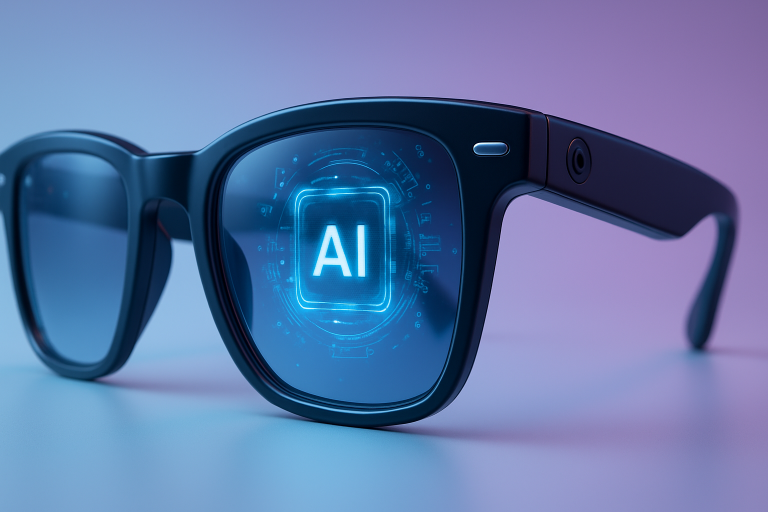
Smart Glasses 2025
![]()
Smart glasses aren’t a futuristic dream anymore — they’re officially here, and 2025 is shaping up to be the year they go mainstream. With Meta launching a new generation of Ray-Ban display glasses, Oakley introducing AI-powered eyewear, and global shipments predicted to skyrocket, the world is entering a new era of wearable technology.
So what exactly is happening — and why is the internet calling 2025 the “Year of Smart Glasses”?
Let’s break it down.
What Are Meta’s New Smart Glasses?

Meta has doubled down on its vision of replacing your phone with your face — literally. Their newest AI-powered glasses combine stylish frames with futuristic features.
Ray-Ban Display Glasses
Meta’s flagship smart glasses now come with:
- A micro display inside the lens
- Hands-free recording
- Full AI assistant built in
- Live translation
- Real-time notifications
- Gesture-based control via the new Neural Band
These look exactly like normal Ray-Bans — but work like a tiny screen floating in front of your eye.
Oakley + Meta: The Sports Smart Glasses King

For fitness lovers, the new Oakley–Meta Vanguard glasses are a game changer.
They bring:
- AI-powered workout coaching
- Video capture during running/cycling
- GPS & fitness metrics
- Ultra-light frame design
- Sweat resistance
- Audio built into the arms of the glasses
Athletes can now track performance, get live AI feedback, and capture POV videos — all without touching a phone.
Why 2025 Is the Smart Glasses Boom Year

Smart glasses were always coming — but 2025 is the year they arrive in our daily life.
1. AR & Smart Glasses Market Is Exploding
Research reports predict that global smart glasses shipments will surge in 2025, driven by Meta, Google, and new Asian manufacturers.
2. Wearables Are Replacing Smartphones
People want faster information:
- No unlocking phone
- No looking down while walking
- Instant display in front of your eye
Meta wants your glasses to become your new interface — and honestly, it’s working.
3. Accessibility Features Are Revolutionary
New AR systems can help people with:
- Color blindness
- Vision tracking
- Real-time captions
- Object recognition
Technology that changes lives is always the first to go mainstream.
How Smart Glasses Will Change Daily Life
Here’s how these glasses will reshape everyday experiences:
Content Creation
No more holding your phone — just tap your temple and record POV.
Always-On AI Assistant
Ask anything.
See answers instantly.
All hands-free.
Travel Made Easy
Live translation captions appear in your view — like magic.
Fitness Tracking
Get pace, heart rate, route updates, and coaching in your field of vision.
Music & Calls
Listen to audio through frame speakers without disturbing people nearby.
Challenges: What’s Still Holding Back Smart Glasses?
Even with all the hype, a few issues remain:
- Battery life is still limited
- Privacy concerns (hidden camera = controversy)
- Price remains premium
- Adoption takes time — not everyone wants a screen in their eye… yet
But these are the same issues smartphones had in their early years.
The Future: Will Smart Glasses Replace Smartphones?
Meta believes glasses + AI will be the next “iPhone moment.”
And with:
- Powerful AI assistants
- Mini displays
- Voice + gesture control
- Real-time information
- Fashionable designs
…it’s becoming more realistic every month.
2025 might be remembered as the year the shift truly began.
Conclusion
Meta’s push into smart glasses isn’t just another tech trend — it’s the beginning of a new digital lifestyle. With AI built into stylish eyewear, AR displays becoming lighter, and global companies racing into the market, smart glasses are finally moving from sci-fi fantasy to daily reality.
Would you wear AI-powered smart glasses?
Tell us in the comments — the future might be sitting right on your face.
Follow Deshi Geek for more updates like this!
FAQ
Are Meta’s smart glasses available worldwide?
They’re launching gradually, starting with the US and Europe, and expanding through 2025.
Do they work without a smartphone?
Some features do, but most require a phone connection for full functionality.
Are Ray-Ban smart glasses safe for eyes?
Yes — the internal displays are designed to be eye-safe and low brightness.
Will smart glasses replace smartphones?
Not immediately, but many experts believe they will become the next major device category.




